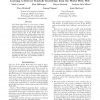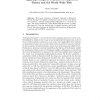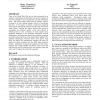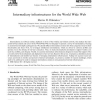1863 search results - page 12 / 373 » The Case for Design Using the World Wide Web |
AAAI
1998
13 years 8 months ago
1998
The World Wide Web is a vast source of information accessible to computers, but understandable only to humans. The goal of the research described here is to automatically create a...
OHS
2000
Springer
13 years 11 months ago
2000
Springer
This paper introduces a Semiotic Appoach to Hypertext Theory. Having been applied to Informatics only in recent years, Semiotics promises a broader understanding of Hypertext as a ...
SIGIR
2002
ACM
13 years 7 months ago
2002
ACM
Users of the World-Wide Web are not only confronted by an immense overabundance of information, but also by a plethora of tools for searching for the web pages that suit their inf...
VLDB
1995
ACM
13 years 11 months ago
1995
ACM
The World-Wide Web (WWW) is an ever growing, distributed, non-administered, global information resource. It resides on the worldwide computer network and allows access to heteroge...
CN
2004
13 years 7 months ago
2004
Intermediaries are software entities, deployed on hosts of the wireline and wireless network, that mediate the interaction between clients and servers of the World Wide Web. In th...




